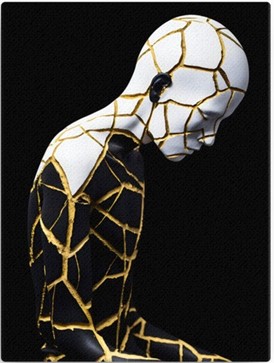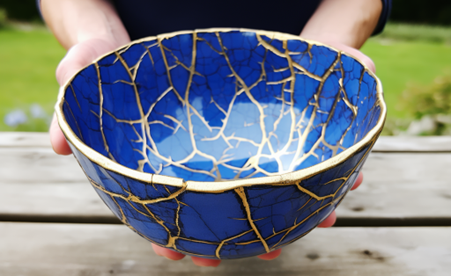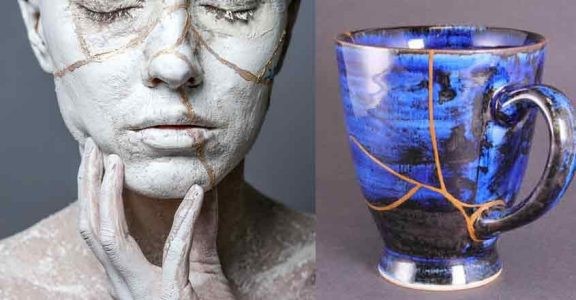Date: 21 May 2024
Author: Humber Recovery and Wellbeing College

In a world obsessed with perfection, there exists an ancient Japanese art form that celebrates the beauty of imperfection and embraces the concept of wabi-sabi – the acceptance of transience and imperfection. This art form is known as Kintsugi, and its philosophy extends far beyond mere craftsmanship, offering profound insights into the human experience and the nature of beauty itself.

At its essence, Kintsugi is the art of repairing broken pottery with gold, silver, or lacquer, transforming flaws into features and emphasizing the history and unique journey of each object. Legend has it that Kintsugi originated in the 15th century when a Japanese shogun sent a damaged Chinese tea bowl back to China for repairs. Upon its return, the bowl had been mended with unsightly metal staples, prompting Japanese craftsmen to devise a more elegant solution – thus, Kintsugi was born.

What sets Kintsugi apart is its profound philosophical underpinnings. Rather than concealing flaws or discarding broken objects, Kintsugi celebrates imperfection as an integral part of the object's history and beauty. The repaired cracks are highlighted with precious metals, creating a striking visual contrast that draws the eye and invites contemplation. In Kintsugi, imperfections are not hidden but illuminated, transforming the broken into the beautiful and revealing the resilience and strength inherent in the process of repair.
Beyond its aesthetic appeal, Kintsugi serves as a powerful metaphor for the human experience. Just as the broken pottery is repaired with gold, so too can we find beauty and strength in our own brokenness. Life's challenges and hardships, like the cracks in the pottery, do not diminish our value but add depth and character to our stories. Through embracing our imperfections and honoring our scars, we can cultivate resilience, wisdom, and a deeper appreciation for the journey of self-discovery and growth.
Central to the philosophy of Kintsugi is the concept of impermanence – the recognition that all things are transient and subject to change. By repairing broken pottery with precious metals, Kintsugi honors the passage of time and the inevitability of decay, transforming loss and destruction into symbols of renewal and transformation. In a world that often fears change and seeks permanence, Kintsugi reminds us to embrace the ebb and flow of life, finding beauty in the fleeting moments and embracing the journey of growth and transformation.
In a culture that often values perfection above all else, Kintsugi offers a refreshing perspective on beauty, resilience, and the human experience. By celebrating imperfection and embracing the art of repair, Kintsugi invites us to find gold in the cracks, transforming brokenness into beauty and honoring the inherent value of every moment and every experience. As we journey through life's ups and downs, may we remember the wisdom of Kintsugi – that imperfection is not a flaw but a feature, and that true beauty lies in the courage to embrace our brokenness and shine brightly, scars and all.
The Humber Recovery and wellbeing college are running Kintsugi session at the Scrapstore in Hull and North Bridlington Library this summer term.
Scrapstore, Hull (10am – 12pm)

North Bridlington Library (10.30 – 12.30pm)

To book a place on the course, you'll need to register as a Recovery College student by completing a short registration form. Once registered, you'll have access to all information regarding Kintsugi and other enriching sessions offered by the Humber Recovery and wellbeing College.
16th October, 2024
24th July, 2024
17th July, 2024
2nd July, 2024